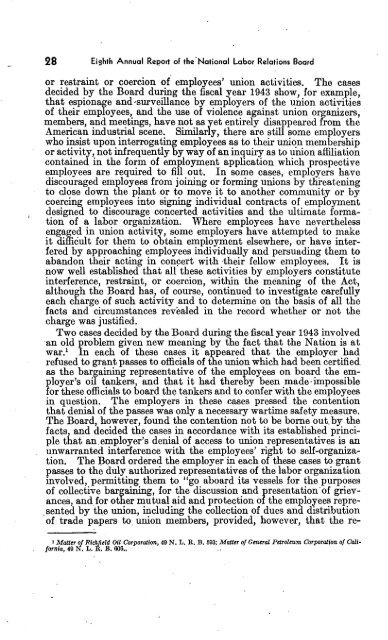1943 - National Labor Relations Board
1943 - National Labor Relations Board
1943 - National Labor Relations Board
You also want an ePaper? Increase the reach of your titles
YUMPU automatically turns print PDFs into web optimized ePapers that Google loves.
28 Eighth Annual Report of the - <strong>National</strong> <strong>Labor</strong> <strong>Relations</strong> <strong>Board</strong>or restraint or coercion of employees' union activities. The casesdecided by the <strong>Board</strong> during the fiscal year <strong>1943</strong> show, for example,that espionage and-surveillance by employers of the union activitiesof their employees, and the use of violence against union organizers,members, and meetings, have not as yet entirely disappeared from theAmerican industrial scene. Similarly, there are still some employerswho insist upon interrogating employees as to their union membershipor activity, not infrequently by way of an inquiry as to union affiliationcontained in the form of employment application which prospectiveemployees are required to fill out. In some cases, employers havediscouraged employees from joining or forming unions by threateningto close down the plant or to move it to another community or bycoercing employees into signing individual contracts of employmentdesigned to discourage concerted activities and the ultimate formationof a labor organization. Where employees have neverthelessengaged in union activity, some employers have attempted to makeit difficult for them to obtain employment elsewhere, or have interferedby approaching employees individually and persuading them toabandon their acting in concert with their fellow employees. It isnow well established that all these activities by employers constituteinterference, restraint, or coercion, within the meaning of the Act,although the <strong>Board</strong> has, of course, continued to investigate carefullyeach charge of such activity and to determine on the basis of all thefacts and circumstances revealed in the record whether or not thecharge was justified.Two cases decided by the <strong>Board</strong> during the fiscal year <strong>1943</strong> involvedan old problem given new meaning by the fact that the Nation is atwar.' In each of these cases it appeared that the employer hadrefused to grant passes to officials of the union which had been certifiedas the bargaining representative of the employees on board the employer'soil tankers, and that it had thereby been made-impossiblefor these officials to board the tankers and to confer with the employeesin question. The employers in these cases pressed the contentionthat denial of the passes was only a necessary wartime safety measure.The <strong>Board</strong>, however, found the contention not to be borne out_ by thefacts, and decided the cases in accordance with its established principlethat an employer's denial of access to union representatives is anunwarranted interference with the employees' right to self-organization.The <strong>Board</strong> ordered the employer in each of these cases to grantpasses to the duly authorized representatives of the labor organizationinvolved, permitting them to "go aboard its vessels for the purposesof collective bargaining, for the discussion and presentation • of grievances,and for other mutual aid and protection of the employees representedby the union, including the collection of dues and distributionof trade papers to union members, provided, however, that the re-Matter of Richfield Oil Corporation, 49 N. L. R. B. 693; Matter of General Petroleum Corporation of California,49 N. L. R. B. 609..
















